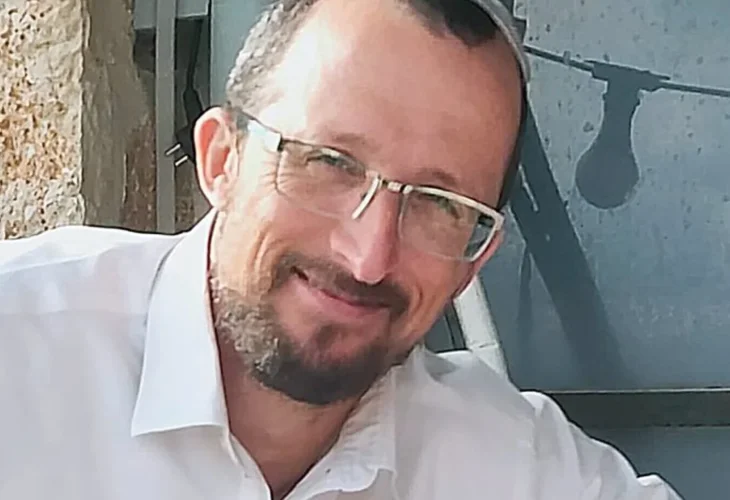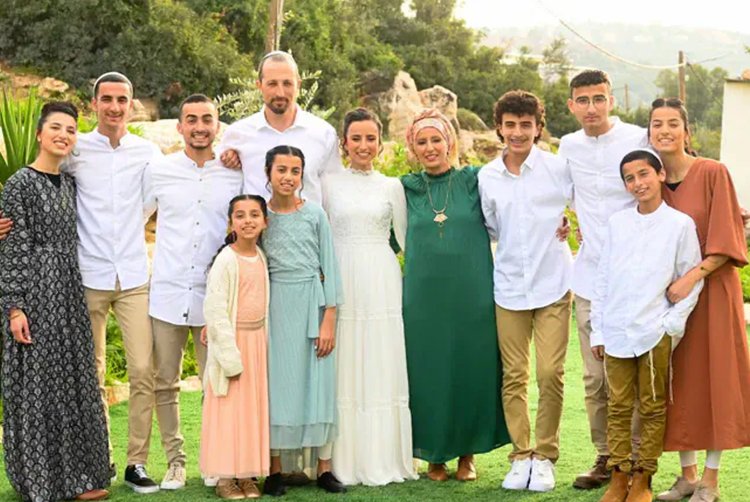Our Father Knew What Was Coming: A Story of Faith and Resilience
Less than a week after the passing of Shaul Moyal in Lebanon, two of his ten children sit down for an emotional conversation about their father, a man deeply devoted to Torah. They reveal the messages he left with them before his death and vow: "We will continue living joyfully, as he would have wanted."
 First Sergeant (Res.) Shaul Moyal (Photo courtesy of the family)
First Sergeant (Res.) Shaul Moyal (Photo courtesy of the family)The three soldiers who came to the Moyal family's home last Shabbat to inform the mother and her ten children that their father, Shaul Moyal, had fallen in the Lebanese war, weren't expecting such a response. "We knew," said Smadar, Shaul's wife, through tears, sharing that since he left for the war a month prior, she had felt he wouldn't return.
"We all felt it," say Binyamin and Yehuda, Shaul's sons, currently sitting Shiva at home, in an interview. "This past Rosh Hashanah, I spoke to a friend, deeply concerned," Binyamin recalls. "I told him, 'I'm praying for my dad all the time, I’m so worried about him.' My friend tried to reassure me, telling me there are many soldiers in similar situations, but I insisted, 'My dad isn’t like the others. He's all about Hashem; he's all about Torah. Every other sentence from him is a verse from the Tanach. I'm afraid Hashem may need him up there.' And indeed, it seems that was the case."
A Life of Simplicity
The modest home of the Moyal family in the settlement of Alon Shvut in Samaria is presently full to overflowing. Visitors continuously arrive to share their unique ties with Shaul. Many are his students, while others learned from him in the past. All describe a man of great spirit for whom Torah was his life's utmost pursuit.
"Dad may be gone, but he left us with profound messages about love for Hashem and learning Torah, and it has been etched in us all," say his children. "What was special is that he truly studied Torah all day, without interruption," adds Binyamin. "Dad went to sleep with a book and then woke at two in the morning for a late-night lesson, and at four, he would get up again to fit in more learning before prayer. Fellow soldiers from his army unit told us he would reach the earliest minyan, and while waiting for everyone, they would see him pacing with his tallit and tefillin, learning and reciting."
"But we also know something else: Dad didn't just study the Torah; he lived it. He always believed in this path, and learning was the only thing that truly made him happy. You never heard him getting excited about anything else or the vanities of this world."
"Dad also loved the creation and nature," Yehuda adds. "He always stood amazed at all the creations Hashem had brought into being. Even at home, he grew plants and volunteered with the Nature and Parks Authority. It's no wonder all the children in our family grew up with a deep love for the land and the environment. It simply passed down from Dad."
 Shaul Moyal's Family (Photo courtesy of the family)
Shaul Moyal's Family (Photo courtesy of the family)How did Dad's way affect you?
"Baruch Hashem, we had the privilege to grow up surrounded by the study of Torah nonstop. Whenever we had questions about material learned in class or needed help with our studies, we knew we could turn to Dad. His simplicity was evident in every area and aspect. He needed nothing else and conveyed this contentment with minimalism to us, as an ideal. For example, we didn't have cell phones until we turned eighteen, and even then, he set the highest level of restrictions on them."
"Dad also always taught us to know that nothing is 'owed to us' and that nothing should be taken for granted. We should appreciate everything we receive. A bed to sleep on? A hot lunch every day? Siblings and parents who care for us? We should always know to thank and value it. This perspective so characterized Dad, and we'd be grateful if those reading this take it upon themselves to appreciate and thank for everything, and may it be in his memory."
Was it hard for you to grow up without all the luxuries your peers had?
Binyamin: "There were sometimes tough times, but ultimately, we always saw before us Dad and Mom, both individuals whose whole essence was simplicity, and those qualities simply seeped into us. When we felt we might be missing out on something, Dad would say, 'Everyone has their own package,' and he'd make sure to explain there are people who enjoy certain things, but we have a father at home, and that’s the greatest gift one can have. Dad really tried to be home in the afternoons as much as possible. We always knew we could study with Dad, ask him questions, and talk with him. It took me time, personally, to understand it’s not a given or common in other homes."
Learning from His Writings
Since their father entered Lebanon, about a week before Rosh Hashanah, his sons recall the entire family's heavy-hearted feeling, reading Tehillim and sensing, even without speaking of it, that he wouldn’t return from the war.
"I'm sure Dad felt it was coming too," Yehuda states. "He even prepared himself for it, ready to face death. Our eldest sister got engaged and married during the war, and one thing he kept saying was, 'Now that I see my daughter has built her home and my older sons are in yeshivas, I feel I’ve accomplished my duty.' When we asked Dad if he wasn’t afraid of dying, he replied, 'I’m forty-seven, I’ve achieved so much in life. Why should I fear?’"
"Dad came home immediately after Yom Kippur and stayed with us until the Shabbat Chol HaMoed Sukkot," shares Binyamin. "During those days, he managed to visit his parents and even his younger brother in Kfar Tapuach. Looking back, you can see he was saying farewell to everyone, as if he knew he wouldn’t see them again. On Shabbat morning, the whole family went out for morning prayers, and then he had to leave us, heading north, telling us he was supposed to be released exactly a week later — after the upcoming Shabbat. Sadly, just hours before his scheduled release, he was killed."
How do you keep going from here? What gives you strength?
Binyamin: "The truth is, before Dad went back the second time, we asked him this exact question, and Dad’s response was in his simplest way: he wouldn’t have gone to the reserves and to war if he wasn’t sure he had a strong wife and a strong home. We asked him, 'What if something, G-d forbid, happens?’ And Dad replied with optimism and determination: ‘Continue living and be happy.’ This statement is so typical of Dad because he never dampened the mood or complained."
"We must take Dad's legacy and continue to be happy," adds his brother, "not because we have no choice, but simply because that’s how Dad would want it. Dad was a fundamentally happy person, even when experiencing tough things, like when his friends died in the war, he cried only in private. So yes, we intend to continue his path — to rejoice and live life to the fullest. We will also continue to learn with him. Dad left behind so many summaries, and after Shiva, we all intend to continue learning with Dad, through his writings."

